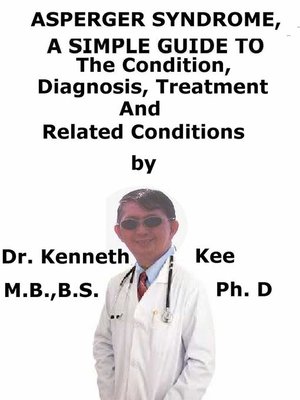Asperger Syndrome, a Simple Guide to the Condition, Diagnosis, Treatment and Related Conditions
ebook
By Kenneth Kee

Sign up to save your library
With an OverDrive account, you can save your favorite libraries for at-a-glance information about availability. Find out more about OverDrive accounts.
Find this title in Libby, the library reading app by OverDrive.



Search for a digital library with this title
Title found at these libraries:
| Loading... |
This book describes Asperger Syndrome, Diagnosis and Treatment and Related Diseases
Asperger syndrome is a form of autism that is often regarded as high functioning.
The main problems are interacting socially, repeat behaviors, and clumsiness.
It is different from other autism spectrum disorders by its relative maintenance of linguistic and cognitive development and above average intelligence.
While not necessary for diagnosis, physical clumsiness and unusual use of language are often reported
Asperger's was removed in the 5th edition of the Diagnostic and Statistical Manual of Mental Disorders (DSM-5) and changed by a diagnosis of autism spectrum disorder on a severity scale.
Causes
The precise cause is not known.
More than likely, an anomaly in the brain is the source of Asperger syndrome.
Genetic factors may have a part, since the disorder is likely to run in families.
A specific gene has not been determined.
Asperger syndrome is a pervasive developmental disorder or autism spectrum disorder (ASD).
The main difference between Asperger syndrome and autistic disorder is that children with Asperger syndrome do not have any speech or cognitive delays.
The disorder seems to be more frequent in boys than in girls.
While people with Asperger syndrome often have problem socially, many of them have above-average intelligence (e.g., Einstein).
They may do well in fields such as computer programming and science.
There is no hindrance in their cognitive development, ability to take care of themselves, or curiosity about their environment.
Symptoms
People with Asperger syndrome (ASD Level I) tend to become over-focused or obsessed on a single object or topic, disregarding all others.
They wish to know everything about a particular topic and often talk about little else.
Children with Asperger syndrome will want to know many facts about their subject of interest but there will appear to be no point of conclusion.
They often do not realize that the other person has no interest in the topic.
The areas of interest may be quite restricted such as an obsession with train schedules, phone books, a vacuum cleaner, or accumulations of objects.
People with Asperger do not pull out from the world unlike people with an autistic disorder.
Their disorders with speech and language in a social situation often result in social isolation.
Their body language may be abnormal.
They have difficulties with eye contact, facial expressions, body postures, or gestures.
They may be regarded by other children as "strange."
People with Asperger syndrome have problems forming relationships with children their own age or other adults, because they:
a.Are unable to respond emotionally in normal social interactions
b.Are not flexible about routines or rituals
c.Have difficulty showing, bringing, or pointing out objects of interest to other people
d.Do not express pleasure at other people's happiness
Anxiety or depression may form during adolescence and young adulthood.
Diagnosis
Neuropsychological testing should direct on simple and complex problem-solving tasks
Genetic testing may be useful
MRI PET scans are all useful.
Treatment
The treatment of people with Asperger syndrome comprises instruction and counseling:
1.To improve the social disabilities
2.Encouragement of special skills
For children and youths, specific interventions are:
1.Communication and language strategies
2.Social skills training.
For youths and adults, interventions may be:
1.Relaxation training
2.Career...






